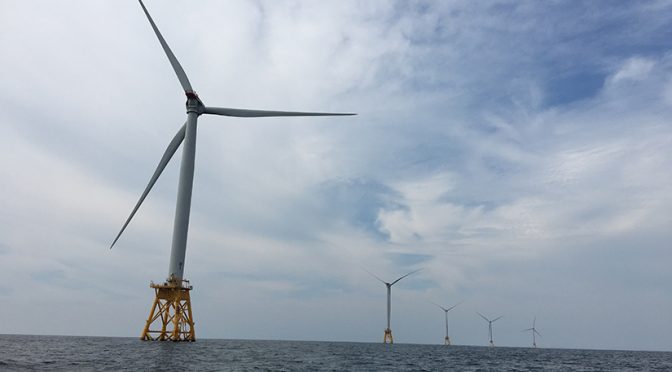Findings consistent with recent National Academies of Science analysis that shows insufficient evidence exists to connect offshore wind to effects on whale prey
A new report commissioned by the American Clean Power Association (ACP) confirms what other scientific bodies have underscored: Climate change is having a far greater impact on the ocean and whale habitats than development of energy projects.
According to the study, Oceanographic Effects of Offshore Wind Structures and Their Potential Impacts on the North Atlantic Right Whale and Their Prey, hydrodynamic effects that occur naturally in the ocean and from climate change are likely to dwarf any possible effects that offshore wind turbines have on the flow of ocean water – and the resulting effects on the availability of prey for the North Atlantic right whale (NARW).
ACP calls on federal regulators to use these findings to help clear permitting hurdles currently holding up several key offshore wind projects whose electrical generation is needed to meet state and federal clean energy and climate goals.
The report, written by scientists with AKRF, Rutgers University and the Bigelow Laboratory for Ocean Sciences, and reviewed by independent experts, investigates an issue raised by federal regulators to determine what, if any, impacts offshore wind farms may have on plankton, a key microscopic food source for the NARW.
After conducting a comprehensive review of the available scientific literature and holding an expert workshop for further discussion, the report authors concluded that natural and seasonal variation have, by far, a greater impact on ocean hydrodynamics than offshore wind development. Another major influence identified in the report is climate change, which the U.S. cannot hope to mitigate without a robust offshore wind industry.
“The offshore wind industry is dedicated to building clean energy infrastructure in a responsible way while recognizing the urgency that climate change presents to get more of our energy from clean, renewable sources,” said Josh Kaplowitz, ACP’s Vice President for Offshore Wind. “We urge federal regulators to rely on well-documented science as they review pending offshore wind permits. The offshore wind industry looks forward to continued partnership with the scientific community and the federal government to advance this necessary energy source that can help reverse the effects of climate change.”
The report found that offshore wind turbines may even have positive effects on the prey species that are important to the NARW by enhancing nutrient mixing in whale habitats and encouraging more prey production.
The report’s findings are consistent with a recently released report prepared independently by the National Academies of Sciences, Engineering, and Medicine (NASEM), which found evidence to suggest that offshore wind turbines could have either a positive, neutral, or negative effect on NARW prey availability.
“Based on what is known, the impacts on ecosystems from development and operation of offshore wind may be difficult to distinguish from natural,” and human-caused variations in ocean hydrodynamics, according to the NASEM report.
These two publications collectively indicate that there is not enough evidence to suggest that offshore wind turbines have a negative impact on NARW prey availability.
“ACP is calling for these results to allay federal regulators’ concerns regarding several offshore wind projects off Southern New England, while bringing federal regulators into compliance with their obligation to act on the best available science and not the most pessimistic assumptions,” said Kaplowitz.
ACP and the offshore wind industry support continued responsible development and future research and monitoring efforts, including funding reviews of existing data, developing plans to use offshore wind turbines as observation and data collection platforms, and continued engagement with, and financial support of, regional marine research initiatives.


